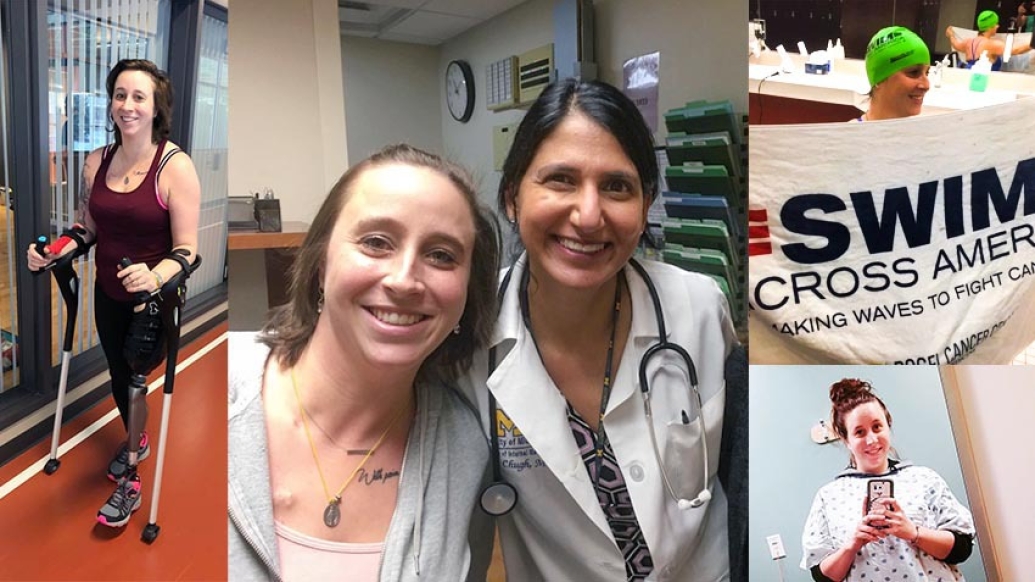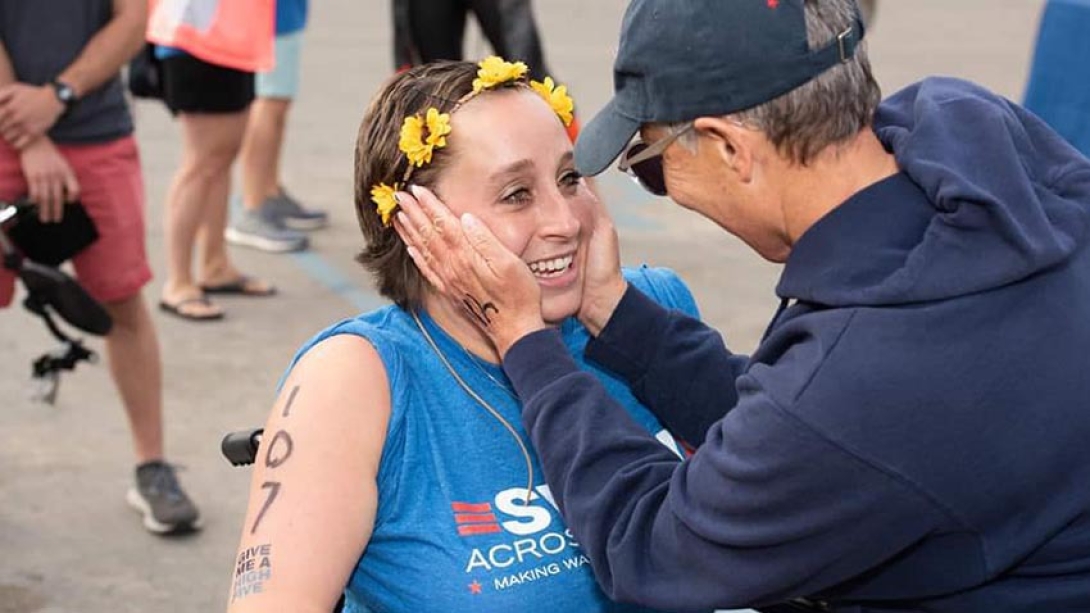First it was bone cancer and the loss of her lower leg that sidelined Kara Wolter from her passion, swimming. Now, after being cancer free for the better part of a year, it’s COVID-19.
12:34 PM
Author |

Editor's note: Information on the COVID-19 crisis is constantly changing. For the latest numbers and updates, keep checking the CDC's website. For the most up-to-date information from Michigan Medicine, visit the hospital's Coronavirus (COVID-19) webpage.
Interested in a COVID-19 clinical trial? Health research is critical to ending the COVID-19 pandemic. Our researchers are hard at work to find vaccines and other ways to potentially prevent and treat the disease and need your help. Sign up to be considered for a clinical trial at Michigan Medicine.
In March 2017, an aggressive bone cancer interrupted Kara Wolter's busy, active life.
For nearly three years, exhaustive treatment, heartbreaking recurrence and painful readjustments kept her largely sidelined from many activities, including her lifelong passion – swimming.
Now Wolter is sidelined again by the social distancing measures required to counter the coronavirus pandemic.
"I can barely remember life without swimming," says Wolter, a native of Southeast Michigan. "I started at age 9 when knee pain kept me from playing other sports, and I've loved it ever since."
At the time, Wolter was diagnosed with Osgood-Schlatter disease, an inflammatory condition that can cause knee pain in active, growing adolescents. With a few timeouts to rehab from injuries and illness, Wolter would swim recreationally and competitively from that point on.
In her mid-20s, pain returned to Wolter's left knee. "I kept ignoring it and rationalizing that it was due to past injuries, or from the constant up and down movements of my work in a day care center."
By March 2017 the pain was so severe that she saw her primary care physician.
MORE FROM MICHIGAN: Sign up for our weekly newsletter
"I imagined a torn ligament, physical therapy and maybe surgery," she says. But initial X-ray, CT and MRI scans and a confirming biopsy revealed something far worse.
Doctors at the University of Michigan Rogel Cancer Center diagnosed Wolter with osteoblastic osteosarcoma, an aggressive cancer that originates in the cells of long bones.
She elected to undergo fertility preservation before starting chemotherapy. "Thanks to good advice from my care team and grant support from the Livestrong Foundation, we harvested 14 eggs, so cancer treatment won't limit my options for starting a family."
Over the next two years, Wolter experienced a rollercoaster of successes and complications with her treatment. An initial surgery to save her leg was successful, but when new tumors were found in her leg in 2019, amputation just above the knee became the best option.
"It was the only way to be sure the cancer wouldn't return or spread from there again," Wolter says. "And while we had hoped to avoid it, in some ways I handled it better than my first leg surgery, when I didn't know whether my leg would be there when I woke up."
Doctors also conducted several operations to remove tumors that had spread to her lungs.
Long before cancer, or COVID-19, swimming was my solace. I'm excited for the day when it can do even more good for more people.Kara Wolter
Despite the setbacks, Wolter returned to the water briefly after the amputation, and hoped to participate in Swim Across America, an annual open water swim to raise money for cancer research; the Detroit Motor City Mile swim supports research at the Rogel Cancer Center.
While the July event came too soon to properly rehab and train, that didn't stop Wolter from providing inspiration. She was at the water's edge to high-five swimmers as they finished, and when called on to make impromptu remarks, she reminded everyone why they were there.
"I was so excited to combine my longtime love of swimming with my new passion for raising awareness and funding for cancer research," she says. "Osteosarcoma treatment hasn't changed much in the last 40 years. Like other rare cancers, more research is needed to advance new treatments like those developed for more common cancers."
Two other achievements capped off 2019. She took her first step on her prosthetic leg on Oct. 1. and two weeks later, her prognosis improved to "no evidence of disease."
On April 6, Wolter celebrated nine months of being cancer-free.
Another unexpected turn: COVID-19

Wolter had planned to spend early 2020 training for this year's Detroit River swim. This time, the novel coronavirus poured cold water on her plans.
Like Podcasts? Add the Michigan Medicine News Break to your Alexa-enabled device or subscribe for daily updates on iTunes, Google Play and Stitcher.
"There have been so many ups and downs to my cancer journey," she notes, "including many lonely days. Now, just when my life was no longer 'on hold,' I'm isolated again — along with everybody else."
Here's how Wolter is adjusting to the life during the pandemic:
- Staying active while maintaining safe distances. During these first warm days of spring, Wolter and her mother, Deb, have been taking regular wheelchair walks in the neighborhood. The two even went kayaking. "It's another way for me to be on the water," Wolter explains. "I've had to adapt my technique to navigate with one leg, but it's an even better core workout."
- Taking advantage of every opportunity to stay connected. To stay in touch, Wolter and her friends have embraced everything from video chats, phone calls and texts to remote Xbox gaming and the occasional 6-feet-apart neighborhood conversation. "I've noticed that, now that everyone is isolating, more people are 'checking in' than when I was going through treatment. Fighting the spread of the virus is teaching everyone what cancer already taught patients like me: not to take for granted the things that really matter."
- Continuing to learn. Wolter is in school, working toward a degree in social work. "Fortunately, I was already attending online classes, so the school closings haven't changed my course schedule." She hopes one day to draw on her life experiences in a career caring for pediatric cancer patients.
The pandemic has altered this year's Swim Across America event, which now allows people to participate by tracking any activity virtually. "Long before cancer, or COVID-19, swimming was my solace. I'm excited for the day when it can do even more good for more people," she says.
Learn More:
Follow Wolter's journey on a blog published by her mom, Deb.
Swim Across America-Motor City Mile will take place virtually this summer. Learn how you can walk, bike, run, swim or pursue any favorite physical activity in any safe location in your local community and support the Rogel Cancer Center.

Explore a variety of health care news & stories by visiting the Health Lab home page for more articles.

Department of Communication at Michigan Medicine
Want top health & research news weekly? Sign up for Health Lab’s newsletters today!





